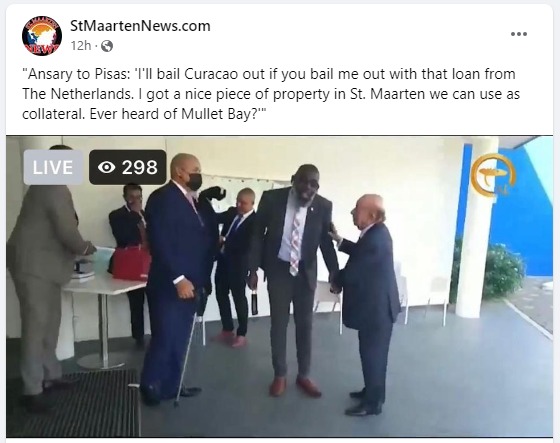Dutch loan to rescue ENNIA meets with criticism
PHILIPSBURG — If the Dutch parliament agrees, insurance company ENNIA will be saved with a 600 million euro loan from the Netherlands. But not everybody is happy with this solution. The deal is that St. Maarten and Curacao extends this loan to ENNIA. If the company for some reason defaults on the loan, both countries will have to deal with the consequences.
There were quite some media reports about the ENNIA-saga after State Secretary Alexandra van Huffelen announced her intention to extend the 600 million-loan to save ENNIA, and not all of those reports were accurate.
The Central Bank of Aruba (CBA) issued a press release contesting a report in the Financieel Dagblad. The article suggested that ENNIA’s entities in Aruba are in trouble and that Aruba has to borrow money from the Netherlands to save the insurance company.
The CBA refers in its defense to a letter State Secretary Van Huffelen sent to the Dutch parliament on August 25, saying that it show clearly “that the problems at ENNIA have nothing to do with Aruba or ENNIA’s Aruban entities.”
The press release assures that these entities are financially health. “They are part of the ENNIA Group but they are also solvent and profitable. They meet all prudential requirements imposed by the law and by the CBA.”
The CBA portrays itself in the press release as a strict supervisor that does not condone anything. “It enforces and intervenes in case there are serious violations of the law.”
The bank decided already in 2007 that the Aruban entities had to become independent after it became aware of certain ENNIA transactions with what the press release calls “associated parties.” It also noted that the Central Bank of Curacao and St. Maarten (CBCS) did not intervene. Since their independency, the Aruban ENNIA entities have their own capital and their own management. “They are under the strict supervision of the CBA,” the press release points out.
In the Netherlands, outlets like NRC and BNR.nl referred to ENNIA as a cheating insurer and they point out that 30,000 pensioners would see a hefty cut in their pensions if the company would go bankrupt.
According to Financieel Dagblad-journalist Vasco van der Boon Dutch taxpayers foot the bill for ENNIA ’s rescue-operation. However, he wrote, the government had little choice. “Poverty is already is serious problem and a large cut in pension payments would result in unrest among the population. The Netherlands was with its back against the wall.”
The court in Curacao sentenced ENNIA ’s sidelined majority shareholder Hushang Ansary to repay millions he took from ENNIA ’s coffers, but the Iranian-American businessman has appealed the verdict and he has not paid a penny so far. The appeals-verdict is expected this week.
Van der Boon furthermore wrote that the 600 million is officially labeled as a loan but he doubts that the Netherlands will ever see that money back. “I would question that. The liquidity loans have to be paid back next month but the Netherlands has to refinance them. The islands are in bad shape and there is a lot of corruption and mismanagement.”
While the 600 million loan the Netherlands is prepared to extend seems to be good news for ENNIA and its policyholders, it has also triggered questions from local politicians. Giselle McWilliam, leader of Curacao’s opposition party MAN spoke of a bittersweet feeling: “Another loan from the Netherlands under strict conditions. What are the consequences?”
Quincy Girigorie, leader of opposition party PAR also has his doubts. He notes that 43 percent of the population in Curacao lives under the poverty line and that the country needs investments in healthcare and education. “The growing debt makes that more difficult.”
Mydutchtimes.com points out that the islands are unable to borrow 600 million on the capital markets against an affordable interest rate. “The Hague uses this as leverage to increase political control. If they islands cooperate, they’ll pay 3.1 percent interest; if they don’t, they’ll have to pay 8 percent per year, or 48 million,”
Financial supervisor CFT is also not happy either with the intention to loan the countries that much money. It will lead to a higher national debt and a higher debt quote (debt as a percentage of gross domestic product). The CFT therefore has qualified the loan as “very undesirable.”
###
Related articles:
Conditions influence interest rates for refinanced liquidity loans
Opinion: Eternal debt
Knipselkrant: Fraudegat bij verzekeraar Ennia plaatst Nederland voor duivels dilemma
Tweede Kamer eist openbaarmaking CFT stukken inzake ENNIA schandaal
Adviezen van het CFT inzake ENNIA




























